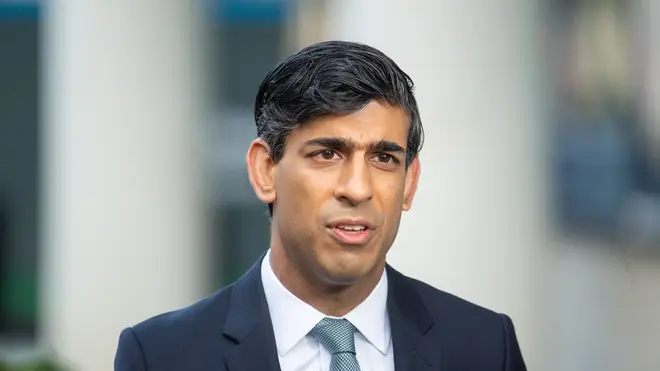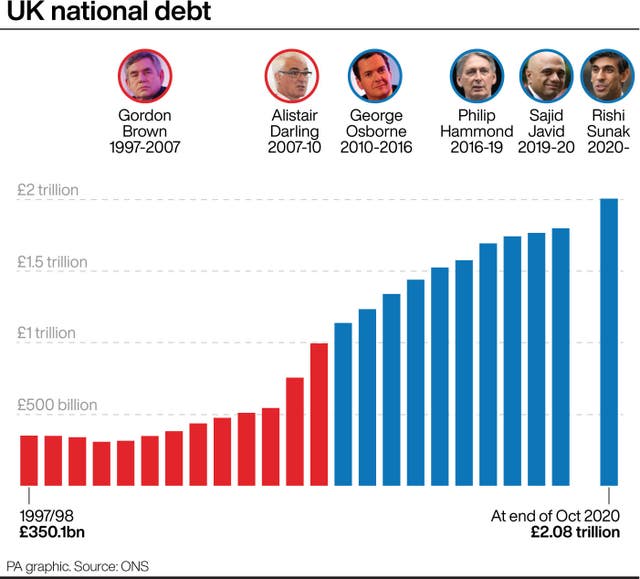
Ben Kentish 10pm - 1am
25 November 2020, 11:14

Chancellor Rishi Sunak’s Spending Review will be delivered against a grim economic backdrop and soaring Government borrowing.
The damage done by coronavirus to the economy and public finances will be laid bare as Chancellor Rishi Sunak sets out his plans for the next year.
Official forecasts from the Office for Budget Responsibility (OBR) make a “sobering read”, No 10 admitted ahead of Mr Sunak’s Spending Review.
The Chancellor is expected to pump billions more of taxpayers’ money into efforts to support jobs and help the health service cope with the impact of the pandemic.
The OBR has previously estimated the Government will borrow £372.2 billion in 2020-21 but the latest figures will be revealed alongside the Chancellor’s statement on Wednesday afternoon.
Our latest forecasts and scenarios for the economy and public finances will be published later this afternoon after the Chancellor’s #SpendingReview speech 📘
Follow us later for charts and highlights 📊 pic.twitter.com/TwzNm0ug8c
— Office for Budget Responsibility (@OBR_UK) November 25, 2020
A No 10 spokesman said Mr Sunak and Treasury Chief Secretary Stephen Barclay updated the Cabinet ahead of the Spending Review.
“Cabinet was told the OBR forecasts will show the impact the coronavirus pandemic has had on our economy and they will make for a sobering read, showing the extent to which the economy has contracted and the scale of borrowing and debt levels,” the spokesman said.
“But – as the IMF (International Monetary Fund), OBR and others have pointed out – the costs would have been much higher had we not acted in the way we have done.”
Ministers were told that Mr Sunak’s three priorities for the Spending Review, which will set departmental budgets for 2021/22, are protecting lives and livelihoods during the pandemic, investing in public services, and funding infrastructure to help “level up and spread opportunity” across the UK.
Mr Johnson told the Cabinet the Government would “work tirelessly on job creation, driving economic recovery and building back better”, the spokesman added.
Final speech prep ahead of tomorrow’s Spending Review.
Watch live straight after PMQs #SR20 pic.twitter.com/IqZYnCrkeE
— Rishi Sunak (@RishiSunak) November 24, 2020
In his Commons statement, the Chancellor will announce the launch of a three-year Restart programme, worth £2.9 billion, which will help more than a million unemployed people get back into work in the wake of the pandemic.
But while business leaders have welcomed the moves to support jobs, Mr Sunak is braced for a backlash from trade unions over an expected freeze on public sector pay as he begins to repair public finances.
He also faces criticism – including from some senior Conservatives and Nobel laureate Malala Yousafzai – over widely signalled plans to slash billions from the foreign aid budget, suspending the UK’s commitment to spend 0.7% of national income on overseas development.
Ahead of his statement, the Chancellor has insisted he is not planning a return to “austerity” and would continue to support the economy as it sought to recover from the pandemic.
As well as the Restart programme, with tailored help for those out of work for more than 12 months, there will be £1.4 billion promised to increase the capacity of Jobcentre Plus and a £375 million skills package.
Other commitments are expected to include £3 billion more to support the NHS, including £1 billion to address the treatment backlogs built up while it was dealing with the Covid-19 crisis.
There will also be measures to support Mr Johnson’s “levelling-up” agenda with the publication of the much-delayed National Infrastructure Strategy and investment across the UK’s regions and nations, including £1.6 billion for local roads.
At the same time however, the Chancellor will take the first steps towards rebuilding the public finances after Government borrowing soared and economic activity ground to a halt due to the pandemic.
The scale of the challenge was underlined by official figures last week which showed that public sector debt had passed the £2 trillion mark for the first time in UK history – taking it over 100% on national income.

It will include a new round of public sector pay restraint – with wages for more than four million workers capped or frozen altogether, with only front line NHS doctors and nurses expected to be exempt – while the Chancellor is also reportedly planning to scrap a planned 5% increase in the national living wage.
The moves have angered unions who said public sector workers bore the brunt of austerity cuts after the global financial crash but Mr Sunak is expected to argue that is the private sector which has been hit the hardest in the pandemic.
He is also expected to announce he is cutting the overseas aid budget to 0.5% of national income – a move denounced as a “strategic mistake” by former prime minister David Cameron who enshrined the 0.7% commitment in UK law.
COVID-19 could force 20 million more girls out of school. To keep girls learning, we need leaders to prioritise education. @BorisJohnson & @RishiSunak : the U.K. pledged 0.7% in aid last year. When you announce spending priorities tomorrow, I hope you'll deliver on that promise.
— Malala (@Malala) November 24, 2020
Sir John Major, another former Tory premier, said the move would be “morally wrong and politically unwise”.
Ms Yousafzai, an education campaigner who shared the 2014 Nobel Peace Prize, called on Mr Johnson and Mr Sunak to “deliver” on their manifesto promise to keep the 0.7% legal target.
“Covid-19 could force 20 million more girls out of school,” she said. “To keep girls learning, we need leaders to prioritise education.”
Ahead of his statement, Mr Sunak said: “My number one priority is to protect jobs and livelihoods across the UK.
“This Spending Review will ensure hundreds of thousands of jobs are supported and protected in the acute phase of this crisis and beyond with a multi-billion package of investment to ensure that no-one is left without hope or opportunity.”
Key workers deserve a pay rise. pic.twitter.com/DSxLvSDlAc
— Trades Union Congress (@The_TUC) November 25, 2020
Shadow chancellor Anneliese Dodds said the country was facing a “jobs crisis” as a result of the Conservatives’ “irresponsible choices” and economic mismanagement.
“They clapped for key workers – but now they’re freezing their pay, and looking to scrap planned minimum wage increases for the private sector,” she said.